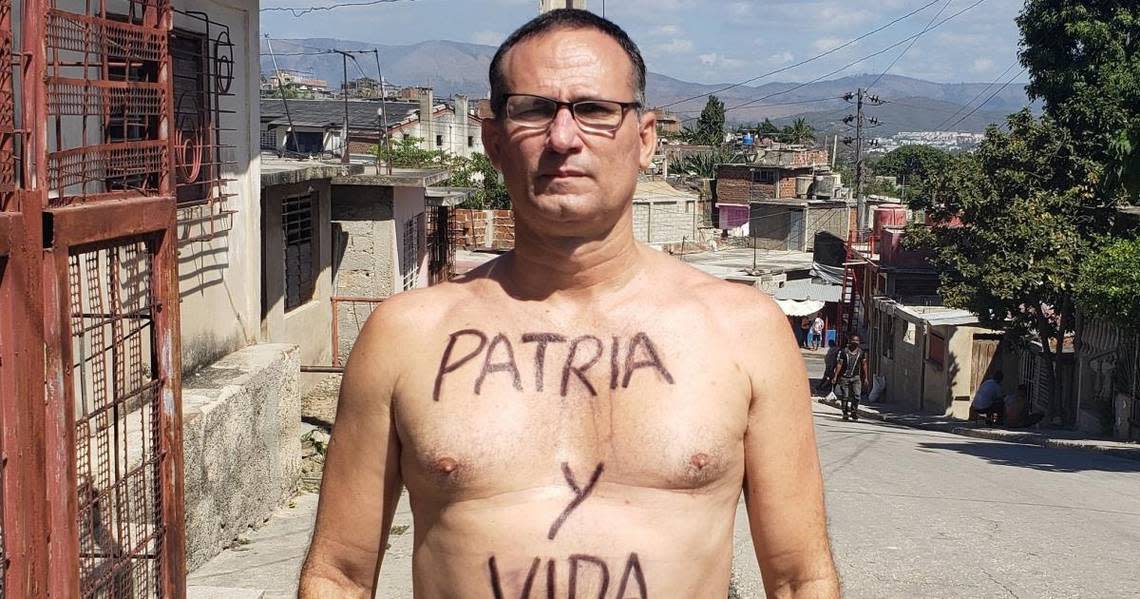Three years after July 11 uprising in Cuba, at least 670 protesters are still behind bars

- Oops!Something went wrong.Please try again later.
Three years after the largest anti-government protests in Cuba, at least 670 Cubans are still in prison for participating in the demonstrations on July 11, 2021, some of them serving sentences of more than 20 years, human rights activists said in a report Thursday commemorating the date.
Justicia 11J, an organization tracking the situation of the protesters, said they confirmed the original arrests of 1,584 people who participated in the protests.
In a Thursday hearing organized by the Inter-American Commission on Human Rights Commission, Camila Rodríguez, Justicia 11J’s director, said the group had documented incidents of harassment, degrading treatment, and withholding of medical care affecting 240 prisoners, especially those with political profiles like opposition leader José Daniel Ferrer.
In an audio, Ferrer’s wife, Nelva Ortega-Tamayo, said family members have not been able to contact him since a brief visit in April. He is been held incommunicado in a high-security prison in the eastern city of Santiago de Cuba and has not been allowed to make phone calls or have family visits since March last year, she said, adding that his health has been deteriorating.
“He is being buried alive,” she said.
U.S. Secretary of State Antony Blinken marked the anniversary Thursday with a statement calling on the Cuban government to release all demonstrators.
“We reiterate our call for their immediate and unconditional release, as well as for the release of all political prisoners detained in Cuba,” he said. “The Cuban people will not be silenced, and neither will our commitment to stand by them in their pursuit of a brighter, freer future. Our message to the Cuban government is unequivocal: the protection of human rights and fundamental freedoms is non-negotiable.”
Diplomatic efforts by the U.S., European governments and the Vatican to obtain the release of the prisoners have failed so far.
A group of Republican lawmakers, including Miami Cuban Americans Mario Díaz-Balart, María Elvira Salazar and Carlos Giménez, introduced a resolution Thursday “commending the courage” of the Cubans who three years ago “stood in the face of brutal harassment, beatings, and torture to protest against the Communist Cuban regime, demanding access to their fundamental rights to life, dignity, and freedom.”
On July 11, Cubans took to the streets all over the island in unprecedented numbers, calling for freedom. They were met with violence from the police, special forces and Cuban government supporters, encouraged by the country’s leader Miguel Diaz-Canel’s live television remarks urging supporters to confront the protesters.
Cuban prosecutors indistinctly charged minors, mothers, seniors, Afro-Cuban religious leaders, prominent artists and members of the opposition who took part in the demonstration or expressed their willingness to join them, with sedition and other grave crimes in what critics say was an effort to intimidate the population and squash dissent.
But smaller protests have continued as the country’s economic situation continues to deteriorate while the Cuban leadership resists reforms and further restricts civil liberties with new laws.
The July 11 protests, fueled by a severe economic crisis, set in motion the most significant migration wave in several decades. Over 627,000 Cubans have migrated to the United States alone since the start of fiscal year 2021, seeking protections at the U.S. border with Mexico or coming legally through a new parole program set up by the Biden administration. Another 65,000 came to the United States through family reunification programs and other legal pathways.
Speaking from his prison cell in the Guanajay high-security prison in Cuba, Luis Manuel Otero Alcantara, a prominent artist and government critic detained since July 11, 2021, said he has “faith... that today we are closer to freedom.”
In an audio published Thursday by Martinoticias, a U.S. Agency for Global Media outlet, Otero Alcantara, who spearheaded the artistic collective San Isidro Movement, said he was willing to sacrifice “for the common good, for our children and because this country is still worth it.”
Several human rights organizations, including the Inter-American Commission on Human Rights, Amnesty International and Victims of Communism, called on the Cuban government on Thursday to free the protesters. In a statement signed by Justicia 11J, Cubalex, Pen International, Artists at Risk and six other organizations, they also noted that the human rights situation on the island has continued to worsen.
Carlos Michel Morales, an independent journalist who served a 34-month sentence for participating in the July 11 demonstrations and was released in March, was again arrested in May and has been on a hunger strike since June 19, Cubadecide, an opposition organization headed by opposition leader Rosa María Payá, said.
The organization said Morales was admitted Tuesday to a hospital in Villa Clara on Monday in critical condition.

